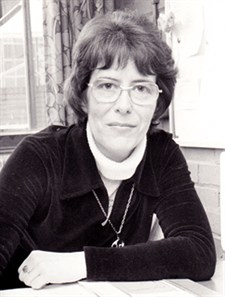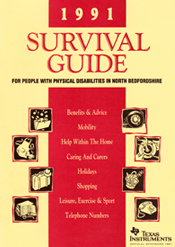Disability strikes
It happened in the Bedford office of the Samaritans. Rosemary, my mother, a volunteer for the charity, was taking a call from a man who was feeling suicidal. She was allowing him to talk things through and was finding it increasingly difficult to respond to him. Rosemary could hear herself slurring her words and felt as though she was slipping down her chair - something bad was happening and she couldn't control it. She gestured to her colleague to take over the call and fought to keep conscious and aware.

Rosemary Joyeux, headteacher at the Portway Centre
It was a cold March day in 1986 and I was visiting my grandfather when his phone rang. It was my flatmate saying that the Samaritans had rung asking that I pick up my mother who seemed to be the worse the wear for drink. That didn't sound right as my mum rarely drank and certainly not during the day, so I drove to their offices. I held Mum's hands and the left one had gone limp, her eyes were not focusing and so I phoned 999. When the ambulance arrived five minutes later the medics assessed that she was probably having a stroke and needed to get to hospital as quickly as possible. True enough, she had suffered a cerebral haemorrhage and the clinicians weren't sure that she'd make it through the night.
Poor Rosemary. Her high blood pressure had been pushed over the edge by stress at work and the result was paralysis on the left side and six months rehabilitation at the stroke unit at Addenbrokes Hospital in Cambridge. At the age of 52, her career as a headteacher had come to an abrupt halt and my life as a carefree twenty-something had ceased too. Now we would have to reconfigure our lives so that she could remain independent and I would have to get used to being a carer.
My grandfather had lived with my mother since her return to Bedford with her two children following separation from our French father in 1962. Pépé, as we knew him, had been hands-on bringing us up and realised the implications of Mum's stroke more quickly than I did. Pépé was still active in his nineties but took the brave decision of volunteering to go into a care home - he would spend his last seven years there till he died, aged 98. This allowed us to adapt the family home for Rosemary's reduced mobility. I moved in and set about finding out what was available to help her get physically better and to have the best quality of life possible.
And that's where the hard work began.
Finding help
In the 1980s there was no single repository of general disability information nationally and locally there was not one organisation that knew what was available either. There were plenty of voluntary and statutory bodies that could offer help to disabled people in Bedfordshire, one just had to find them. For the first three years that I was a carer for Mum I got a job in a distribution depot from 2 till 10pm which allowed me time to continue my writing and researching as well as take her to appointments and the University of the Third Age. But even with my researching skills it took me three years to get a handle on who did what where and for how much.

Survival Guide front cover - 1991
With 2,000 new families having disability thrust on them in Bedfordshire every year, I felt that something needed to be done. I wrote to all the local government organisations and big businesses in Bedford and finally one came good. Texas Instruments were a big employer in the area at the time and generously offered to print in-house 7,000 copies of a 20 page brochure I had compiled. And it was a BBC Radio 4 producer who came up with the title 'Survival Guide' as word got out and I was interviewed for their consumer programme.
There were six more Survival Guides published in different areas over the next decade sponsored by big local concerns such as Granada, Whitbread and Vauxhall, as well as Social Services. Eventually, local and national disability information providers emerged and took on the job of informing people of rehabilitation opportunities, entitlement to benefit and access to counselling.
And I moved on too. After a spell as a professional carer, looking after old boys in their own homes, and a six month contract as a continuity writer for the BBC part of the Open University in Milton Keynes, I became the publications manager at the Spinal Injuries Association in London. This gave me the chance to help produce high quality books and videos for healthcare professionals and for wheelchair users too. More about this on the following pages.